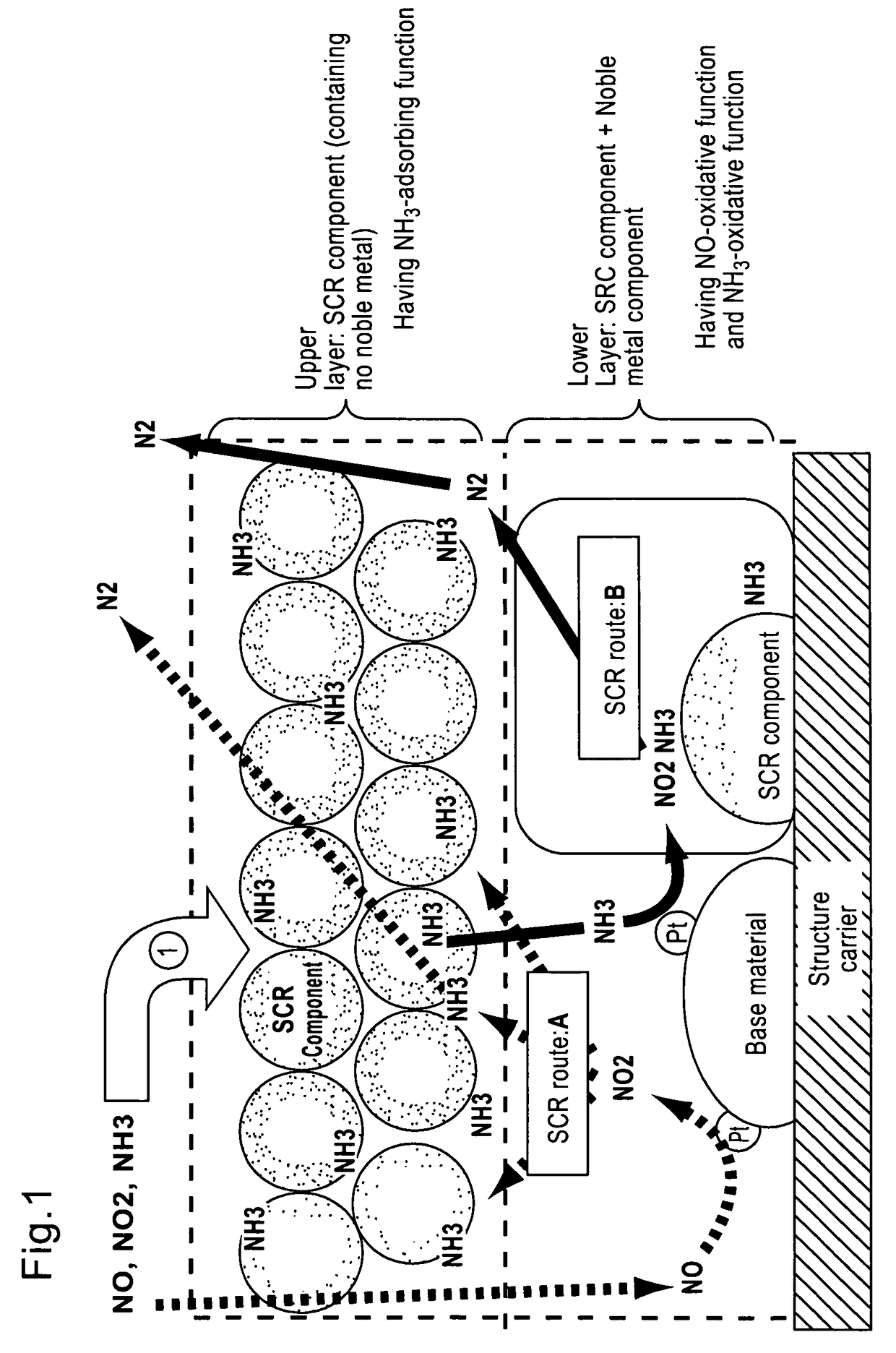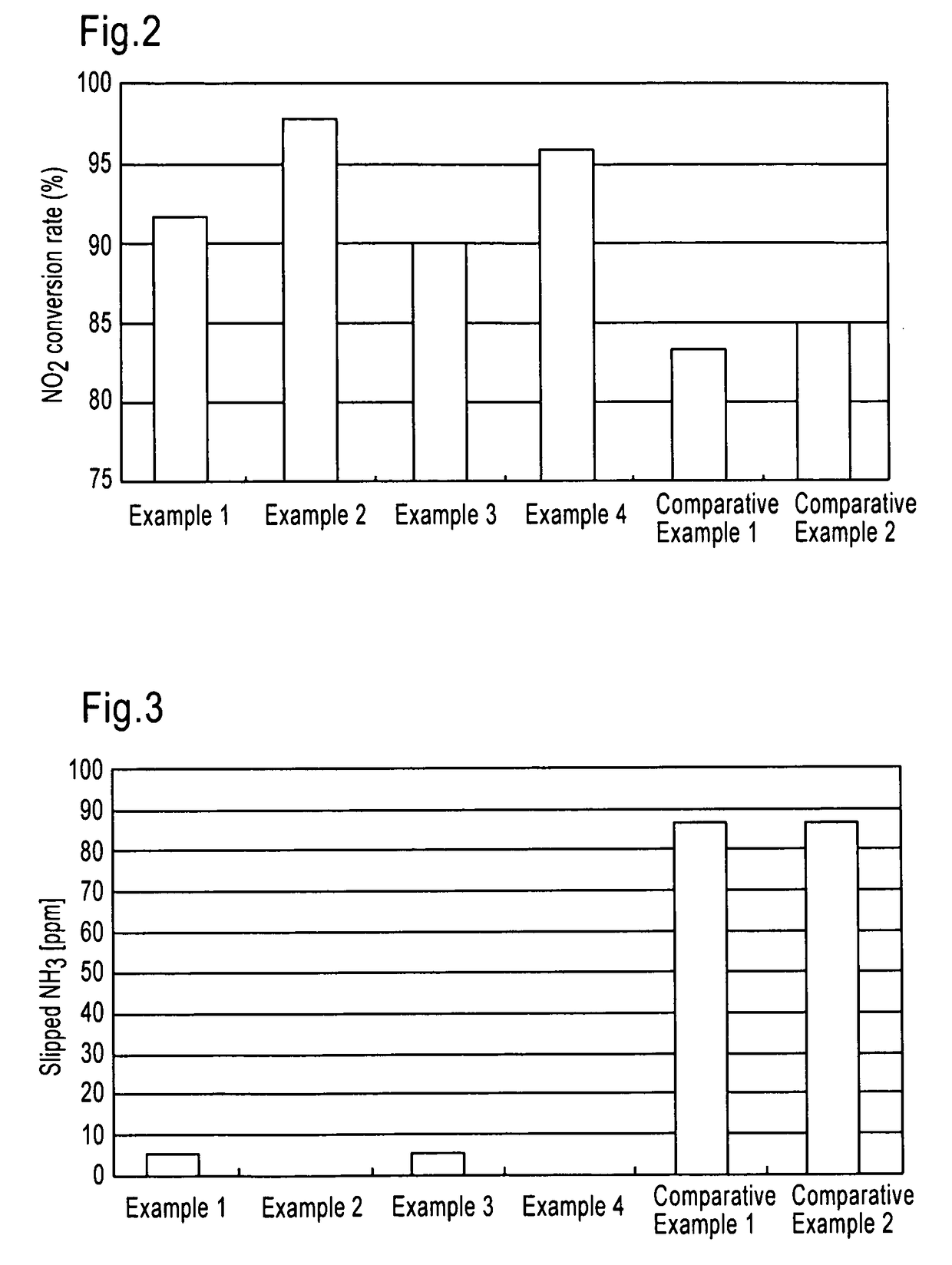Selective catalytic reduction type catalyst
a catalytic reduction and catalytic technology, applied in the direction of physical/chemical process catalysts, separation processes, arsenic compounds, etc., can solve the problems of difficult to properly inhibit the generation of harmful substances, large amounts of harmful substances such as nitrogen oxides, and nh/sub>3/sub>itself harmful effects such as irritating odor, and achieve superior no2 purification performance and nh3 purification performance. , the effect of high efficiency
- Summary
- Abstract
- Description
- Claims
- Application Information
AI Technical Summary
Benefits of technology
Problems solved by technology
Method used
Image
Examples
examples
[0157]Hereinafter, the features of the present invention will be further clarified by showing Examples and Comparative Examples. It should be noted that the present invention is not limited to the embodiments of these Examples. It should be noted that the catalysts used in Examples and Comparative Examples were prepared according to the methods described below.
[Production of SROC (1)]
=Lower layer (catalyst layer having an oxidative function for NH3)=
[0158]Titania powder (BET value: 100 m2 / g) as a base material was impregnated with an aqueous platinic chloride solution as a raw material of noble metal component to support platinum (2.5% by weight in Pt equivalent), and the mixture was further added with water, β-type zeolite ion-exchanged with iron element (concentration: 2% by weight in iron element equivalent, ion-exchange percentage: 70%, SAR=40), and silica as a binder to adjust concentration, then milled in a ball mill to obtain a slurry of NH3-oxidation catalyst part. This slur...
examples 1 , 2
Examples 1, 2
[0166]The selective catalytic reduction type catalyst of the present invention SROC (1) prepared as described above was arranged together with DOC in an exhaust gas pipe as shown below. (NH3) represents a position of supplying an urea aqueous solution as an ammonia component by spraying.
[0167]Example 1: DOC+(NH3)+SROC (1)
[0168]Example 2: DOC+(NH3)+SCR+SROC (1)
examples 3 , 4
Examples 3, 4
[0169]The selective catalytic reduction type catalyst of the present invention SROC (2) prepared as described above was arranged together with DOC in an exhaust gas pipe as shown below. (NH3) represents a position of supplying an urea aqueous solution as an ammonia component by spraying.
[0170]Example 3: DOC+(NH3)+SROC (2)
[0171]Example 4: DOC+(NH3)+SCR+SROC (2)
PUM
| Property | Measurement | Unit |
|---|---|---|
| thicknesses | aaaaa | aaaaa |
| molar ratio | aaaaa | aaaaa |
| temperature activity | aaaaa | aaaaa |
Abstract
Description
Claims
Application Information
 Login to View More
Login to View More - R&D
- Intellectual Property
- Life Sciences
- Materials
- Tech Scout
- Unparalleled Data Quality
- Higher Quality Content
- 60% Fewer Hallucinations
Browse by: Latest US Patents, China's latest patents, Technical Efficacy Thesaurus, Application Domain, Technology Topic, Popular Technical Reports.
© 2025 PatSnap. All rights reserved.Legal|Privacy policy|Modern Slavery Act Transparency Statement|Sitemap|About US| Contact US: help@patsnap.com


